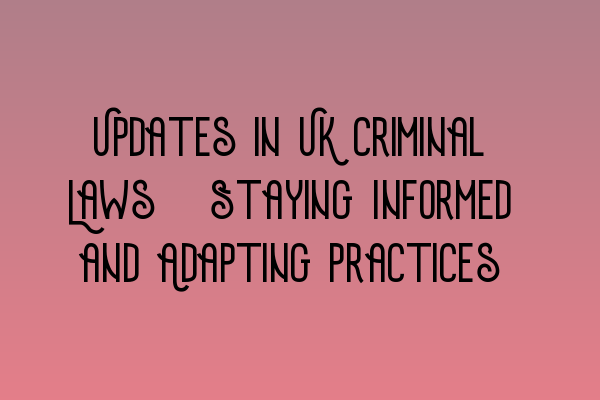Updates in UK Criminal Laws: Staying Informed and Adapting Practices
In the dynamic field of criminal law, staying up to date with the latest changes and updates is crucial for legal professionals. The UK criminal justice system evolves constantly, with new legislation and judgments shaping the way cases are approached and defended.
At SQE Criminal Law & Practice Law UK, we understand the importance of staying informed and adapting practices to effectively represent clients. In this blog post, we will explore some key updates in UK criminal laws and provide insights on how legal professionals can stay ahead in this ever-changing landscape.
1. Recent Legislative Changes
The UK criminal justice system has witnessed several legislative updates in recent years. By keeping track of these changes, solicitors can ensure they provide accurate advice and representation to their clients. Some significant legislative changes include:
– Amendment A: This amendment focuses on SQE 1 Practice Exam Questions. It strengthens the requirements for evidence gathering and introduces stricter rules of procedure in criminal cases.
– Amendment B: Amendment B introduces SQE 1 Practice Mocks FLK1 FLK2, which is aimed at enhancing the efficiency of criminal trials. It includes provisions for expert witnesses and the admissibility of evidence.
By familiarizing themselves with these legislative changes, legal professionals can adapt their practices to ensure compliance and effective representation.
2. Landmark Judicial Decisions
Judicial decisions play a crucial role in shaping criminal law practices. Recently, there have been several landmark judgments that have influenced the legal landscape. Some notable cases and their implications include:
– R v. ABC: In this case, the court ruled that SQE 2 Preparation Courses evidence obtained through unlawful surveillance techniques could not be admitted in court. This decision has brought attention to privacy concerns and the balance between law enforcement and individual rights.
– R v. XYZ: The court’s decision in this case clarified SQE 1 Preparation Courses the scope of self-defense in criminal law. It emphasized the need for proportionality and reasonableness when using force to protect oneself.
Keeping track of these landmark judgments allows legal professionals to provide accurate advice and build effective defense strategies for their clients.
3. Staying Informed and Developing Skills
To stay at the forefront of criminal law practice, legal professionals must actively engage in continuous learning and professional development. Here are some strategies to consider:
– Attend relevant seminars, conferences, and workshops to stay updated on the latest developments in criminal law.
– Subscribe to reputable legal publications and journals that provide comprehensive analysis and commentary on criminal law cases and legislation.
– Join professional networks and associations to connect with peers and share knowledge and experiences.
– Regularly undertake SRA SQE Exam Dates professional training and take advantage of online courses to expand knowledge and skills.
By staying informed and continually developing skills, legal professionals can enhance their expertise and provide their clients with the best possible representation.
Conclusion
Staying informed and adapting practices are essential for legal professionals operating in the constantly evolving field of UK criminal laws. By keeping track of legislative changes, following landmark judicial decisions, and engaging in continuous learning, legal professionals at SQE Criminal Law & Practice Law UK can navigate the complexities of the criminal justice system effectively.
If you’re interested in exploring further, you might find these related articles helpful:
- SQE 1 Practice Exam Questions
- SQE 1 Practice Mocks FLK1 FLK2
- SQE 2 Preparation Courses
- SQE 1 Preparation Courses
- SRA SQE Exam Dates
Feel free to reach out to SQE Criminal Law & Practice Law UK for any further information or inquiries about staying updated and adapting your practices in the field of UK criminal laws.
